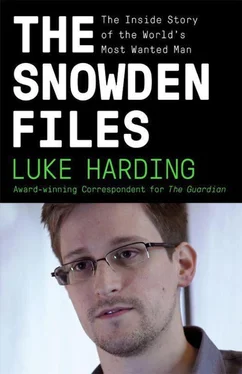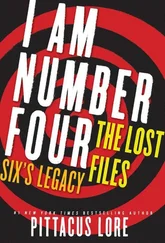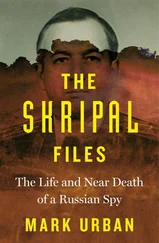Snowden explained that his pay and housing allowance in Hawaii before he joined Booz Allen Hamilton as an infrastructure analyst came to $200,000. (He took a pay cut to join Booz. MacAskill conflated his former and current salary, leading some to wrongly accuse Snowden of exaggerating his income.)
Snowden anticipated he would encounter scepticism. He had brought with him from Kunia a heap of documents. ‘He had a ridiculous amount of identification,’ Greenwald says.
MacAskill asked a series of follow-ups. How had he got involved in intelligence work? What year had he joined the CIA? He told MacAskill of his foreign postings in Switzerland and Japan, and of his most recent assignment in Hawaii. What was his CIA ID? Snowden revealed that too. Most bafflingly, why was he in Hong Kong? Snowden said it had ‘a reputation for freedom in spite of the People’s Republic of China’ and a tradition of free speech. It was ‘really tragic’ that as an American he’d been forced to end up there, he said.
And when did he make the fateful decision to become a whistleblower?
‘You see things that may be disturbing. When you see everything, you realise that some of these things are abusive. The awareness of wrongdoing builds up. There was not one morning when I woke up [and decided this is it]. It was a natural process.’
Snowden said he hadn’t voted for Obama in 2008 but had ‘believed’ in his promises. (He voted for a ‘third party’, instead, he said, a reference to the libertarian Ron Paul.) He had intended to ‘disclose’ what he had found out, but decided to wait and see following Obama’s election. What did happen, he said, was profoundly disillusioning: ‘He continued with the policies of his predecessor.’
All of this made sense. But some of Snowden’s CV was a little odd. Snowden said that he hadn’t been to university, and had instead attended a Maryland community college. This set off alarm bells for MacAskill – how could someone as smart as Snowden achieve such a high-profile job so quickly without a degree? In his career as a spy Snowden appeared to have worked for practically everybody in a remarkably short period of time: the NSA, CIA and the DIA, the Defense Intelligence Agency, either on contract or as a direct hire.
Snowden then mentioned that he had undergone basic training to join the US special forces, only to abandon the plan when he broke his legs. ‘I thought, Christ, this sounds a bit like a fantasist,’ MacAskill admits. ‘The story was [like a] Boy ’s Own adventure.’
Yet gradually, MacAskill did become convinced that Snowden’s account of his life was true, despite its unlikely and even picaresque moments. He moved on to a core issue: ‘What you are doing is a crime. You are probably going to jail for the rest of your life. Why are you doing it? Is it really worth it?’
Snowden’s answer was convincing to his questioner: ‘We have seen enough criminality on the part of government. It is hypocritical to make this allegation against me. They have narrowed the public sphere of influence.’ He acknowledged that ‘nothing good’ was likely to happen to him. But said he didn’t regret his decision, or want to live in a world ‘where everything I do and say is recorded’. As he explained: ‘The NSA has built an infrastructure that allows it to intercept almost anything. With this capability, the vast majority of human communications are automatically ingested.’ Federal agencies had hijacked the internet, he said. They had turned it into a machine for spying on whole populations.
MacAskill had met leakers before from his time as a correspondent in Britain’s House of Commons. For the most part these were politicians. Some spilled information for reasons of ambition; others out of vengeance; many had a gripe, felt slighted, or had missed out on promotion. The reason was usually a pretty base one. But Snowden was different. ‘He had a sense of idealism. It was a patriotic act,’ MacAskill says.
Snowden stressed his overriding belief that the internet should be free. On one of his black laptops was an indicator to his stance: a sticker from the Electronic Freedom Forum, a US group that campaigns for internet transparency. It read: ‘I support online rights.’ Another sticker was for the anonymous router Tor, which is used to disguise the origin of internet messages.
As a Washington correspondent, MacAskill understood some of Snowden’s fervour. The Scot had covered Obama’s 2008 election campaign. He recognised that for Snowden and other Americans, the US constitution is special: it enshrines basic freedoms. Snowden believed that the US government’s stealth attack on it was the equivalent of an attack that occupies land – a terrible and illegitimate invasion. He viewed his own deeds in explicitly patriotic terms. He saw his leak not as an act of betrayal but as a necessary corrective to a spy system that had grown dysfunctional.
‘America is a fundamentally good country,’ he maintained. ‘We have good people with good values. But the structures of power that exist are working to their own ends, to extend their capability at the expense of the freedom of all publics.’
Critics would subsequently accuse Snowden of narcissism, claiming it was a desire for attention that had made him spill the NSA’s beans. MacAskill formed another impression, of a diffident individual far more at home in front of his laptop than in the limelight. ‘He was personable and courteous. His instinct is to be friendly. He is really shy,’ he says. ‘A lot of people are suggesting he was after celebrity status. He isn’t.’ When MacAskill took a few snaps of Snowden he was visibly uncomfortable. Snowden was in fact happiest when talking about the technical details of surveillance. ‘He has got a real nerdy side to him. He’s comfortable with computers. That’s his world.’
Greenwald and MacAskill were internet bumpkins who knew little about how the web actually worked (although Poitras’s technical skills were formidable). The two men struggled to make sense of many of the PRISM slides. Snowden talked them through the complex diagrams. He explained acronyms, pathways, interception techniques. He wasn’t patronising but patient and articulate, MacAskill says, in his element among double-barrelled NSA program codenames. To outsiders they were gobbledygook, an impenetrable alphabet spaghetti.
Because he was British, MacAskill asked, almost as an afterthought, whether there was a UK role in this mass data collection. It didn’t seem likely to him. Most Britons’ benign mental image of GCHQ was of boffins in tweed jackets, puffing on pipes, cracking wartime Nazi codes and playing chess.
MacAskill knew that GCHQ had a long-standing intelligence-sharing relationship with the US, but he was taken aback by Snowden’s vehement response. Snowden said: ‘GCHQ is worse than the NSA. It’s even more intrusive.’
It was another piece of sensational information.
Each time MacAskill and Greenwald went to visit Snowden they expected him to have gone, to have been arrested, press-ganged and taken to a dark modern gulag.
The following day, Wednesday 5 June, Snowden was still in place at the Mira Hotel. That was the good news. No one had grabbed him. The bad news was that the NSA and the police had been to see his girlfriend back at their home in Hawaii. Snowden’s absence from work had been noted, an automatic procedure when NSA staff do not turn up. Snowden was calm, as usual, but outraged at the treatment of Lindsay Mills. He thought the police were badgering and intimidating her.
He had so far said little about his personal life; his focus was the story and what it said about the US surveillance state. His mother, Wendy, worked as a clerk at the district court back in Baltimore. Since he had vanished on 20 May, she had been trying to contact him. She realised something had gone wrong.
Читать дальше












